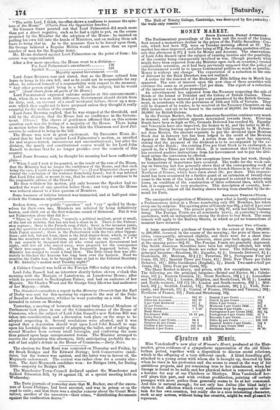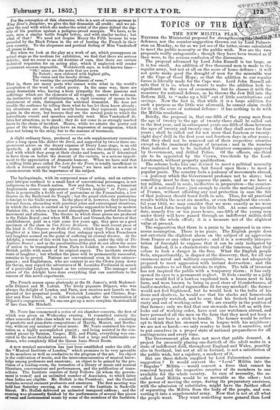t4ratrto hub 311uoir.
Miss Vandenhoff's new play of Woman's Heart, produced at the Hay- market, gives evidence of a sympathetic appreciation of the old Eliza- bethan period, together with a disposition to discuss social relations, which is the offspring of a very different epoch. A blind foundling girl, attached to a young artist with whom she is brought up, deserted by him when he rises in his profession and she seems to stand in the way of his projects, and yet remaining true to her attachment when her lineage is found to be noble and her physical defect is removed, might be a heroine for any of our Fletehers or Shirleys. Miss Vandenhoff her- self plays this part, and with evident predilection, pointing off certain passages with more pathos than generally seems to be at her command. And this is natural enough ; for not only has Isilina (the blind lady) a claim to that affection which every authoress may be supposed to enter- tain for her own creation, but really she is a nice interesting character, each as any actress, without being her creatrix, might be well pleased to represent.
For the conception of this character, who is a sort of cousin-german to sing Rene's Daughter, we give the fair dramatist all credit; and we ad- mire the zeal with which she makes the artist of the piece defend the dig- nity of his position against a pedigree-proud marquis. We have, to be sure, seen a similar battle fought before, and with similar tactics ; but what of that ? We need not despise Henry the Fifth because he was preceded by the Black Prince in the art of beating the French in their own country. To the eloquence and poetical feeling of Miss Vandenhoff all praise is due. But when we look at the play as a work of art, which presupposes an actual stage as the medium for exhibition, we find that there are serious defects; and we recur to an old doctrine of ours, that there are certain technical requisites for an acting play, which if neglected will render permanent success impossible. Wordsworth says, in well-known lines-
" Oh m many are the poets that are sown By Nature; men endowed with highest gifts, The vision and the faculty divine, Yet wanting the accomplishment of verse."
That is, there are many poets who cannot write what in the world's acceptation of the word is called poetry. In the same way, there are many dramatists who, having a keen sympathy for those passions and sufferings which are the elements of all tragedy, cannot write a drama. An instinctive spirit of utilitarianism, a rigid economy of means in the attainment of ends, distinguish the artistical dramatist. He does not trouble the audience by telling them what he has let them know already ; his situations are strong, not merely because they represent important points in the story, but because they are the several goals to which the subordinate events and speeches naturally tend. Miss Fandenhoff di- lutes her situations, so to speak; they do not come in as strongly marked knots in the chain of incident. Hence, while we admire the poetry and grace of the writer, the plays leave an impression of meagreness, which does not belong to the story, but to the manner of treatment.



























 Previous page
Previous page